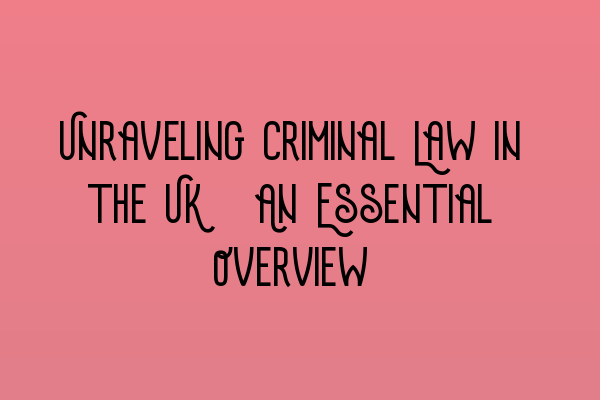Unraveling Criminal Law in the UK: An Essential Overview
Welcome to SQE Criminal Law & Practice Law UK, your trusted source for comprehensive information on criminal law in the UK. In this blog post, we aim to provide you with a detailed overview of criminal law in the UK, covering its key concepts, principles, and procedures. Whether you are a law student, legal professional, or simply someone interested in understanding the legal system, this article will serve as an invaluable resource.
Understanding Criminal Law
Criminal law is a branch of the legal system that deals with offenses committed against the state or society as a whole. It encompasses a wide range of acts, from minor misdemeanors to serious felonies. The primary purpose of criminal law is to maintain order, safeguard public interest, and provide justice to victims.
When it comes to criminal law in the UK, it is essential to familiarize yourself with key legislation, such as the Theft Act 1968, Misuse of Drugs Act 1971, and the Sexual Offences Act 2003. These acts, along with numerous others, define specific crimes, their elements, and the corresponding penalties.
For aspiring lawyers preparing for the SQE 1 exam, we recommend practicing with SQE 1 Practice Exam Questions and taking advantage of SQE 1 Practice Mocks FLK1 FLK2 to enhance your understanding of criminal law and familiarize yourself with the exam format.
The Criminal Justice Process
The criminal justice process in the UK involves several stages, starting from the commission of an offense to the final resolution of the case. It typically includes the following:
- Investigation: Law enforcement agencies gather evidence and interview witnesses to establish the facts of the case.
- Arrest: If there is sufficient evidence, the police may arrest the suspect.
- Charge: The prosecutor formally accuses the defendant of committing a crime.
- Trial: The case is presented in court, and both the prosecution and defense present their arguments.
- Verdict: The judge or jury determines the guilt or innocence of the defendant.
- Sentencing: If convicted, the offender receives a suitable punishment depending on the seriousness of the crime.
To prepare effectively for the SQE 2 exam, SQE Criminal Law & Practice Law UK offers comprehensive SQE 2 Preparation Courses that cover all aspects of the criminal justice process and equip you with the required knowledge and skills.
Key Principles of Criminal Law
In the UK, criminal law operates under several fundamental principles, including:
- Presumption of Innocence: A person is considered innocent until proven guilty.
- Burden of Proof: The prosecution must prove the defendant’s guilt beyond a reasonable doubt.
- Right to Legal Representation: Every person has the right to legal representation and a fair trial.
- Double Jeopardy: A person cannot be tried for the same crime twice.
These principles not only protect the rights of individuals but also ensure the integrity and fairness of the criminal justice system.
Stay Updated: SQE Exam Dates
If you aspire to become a qualified solicitor in the UK, it is crucial to stay updated with the latest SRA SQE Exam Dates. Knowing the exam deadlines and timetables will help you plan your preparation effectively and maximize your chances of success.
At SQE Criminal Law & Practice Law UK, we are dedicated to providing you with the best resources and guidance to excel in your legal career. In addition to our preparation courses, we offer a variety of articles and guides to deepen your understanding of criminal law and the legal profession.
Whether you are looking for SQE 1 preparation courses or want to enhance your knowledge of criminal law, our team of experts is here to assist you every step of the way. Feel free to explore our website for more information and get in touch with us for any inquiries.
Thank you for choosing SQE Criminal Law & Practice Law UK as your trusted source for unraveling criminal law in the UK.
